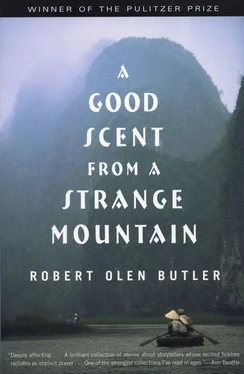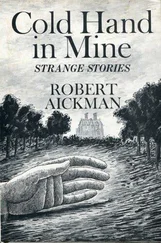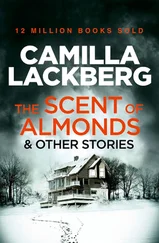“Your own country was very different,” Mr. Cohen said.
It pleased me that he thought just the way I once did. You could tell that he wished there was an easy way to make me feel better, make the dream go away. But I said to him, “This is what I also thought. If I could just go to a warm climate, more like home. So I came down to New Orleans, with my mother, just like you, and then we came over to Lake Charles. And it is something like Vietnam here. The rice fields and the heat and the way the storms come in. But it makes no difference. There’s no snow to scare me here, but I still sit alone in this chair in the middle of the afternoon and I sleep and I listen to the grandfather over there ticking.”
I stopped talking and I felt like I was making no sense at all, so I said, “I should check on your order.”
Mr. Cohen’s hand came out over the table. “May I ask your name?”
“I’m Miss Giàu,” I said.
“Miss Giau?” he asked, and when he did that, he made a different word, since Vietnamese words change with the way your voice sings them.
I laughed. “My name is Giàu, with the voice falling. It means ‘wealthy’ in Vietnamese. When you say the word like a question, you say something very different. You say I am Miss Pout.”
Mr. Cohen laughed and there was something in the laugh that made me shiver just a little, like a nice little thing, like maybe stepping into the shower when you are covered with dust and feeling the water expose you. But in the back of my mind was his carry-out and there was a bad little feeling there, something I wasn’t thinking about, but it made me go off now with heavy feet to the kitchen. I got the bag and it was feeling different as I carried it back to the front of the restaurant. I went behind the counter and I put it down and I wished I’d done this a few moments before, but even with his eyes on me, I looked into the bag. There was one main dish and one portion of soup.
Then Mr. Cohen said, “Is this a giau I see on your face?” And he pronounced the word exactly right, with the curling tone that made it “pout.”
I looked up at him and I wanted to smile at how good he said the word, but even wanting to do that made the pout worse. I said, “I was just thinking that your wife must be sick. She is not eating tonight.”
He could have laughed at this. But he did not. He laid his hand for a moment on his beard, he smoothed it down. He said, “The second dinner on Christmas Eve was for my son passing through town. My wife died some years ago and I am not remarried.”
I am not a hard-hearted girl because I knew that a child gets over the loss of a father and because I also knew that a man gets over the loss of a wife. I am a good girl, but I did not feel sad for Mr. Cohen. I felt very happy. Because he laid his hand on mine and he asked if he could call me. I said yes, and as it turns out, New Year’s Eve seems to be a Jewish holiday. The Vietnamese New Year comes at a different time, but people in Vietnam know to celebrate whatever holiday comes along. So tonight Mr. Cohen and I will go to some restaurant that is not Chinese, and all I have to do now is sit here and listen very carefully to Grandfather as he talks to me about time.
You may be surprised to learn that a man from Vietnam owns one of John Lennon’s shoes. Not only one of John Lennon’s shoes. One shoe that he was wearing when he was shot to death in front of the Dakota apartment building. That man is me, and I have money, of course, to buy this thing. I was a very wealthy man in my former country, before the spineless poor threw down their guns and let the communists take over. Something comes into your head as I speak: This is a hard man, a man of no caring; how can he speak of the “spineless poor"? I do not mean to say that these people are poor because they are cowards. I am saying that being poor can take away a man’s courage. For those who are poor, being beaten down, robbed of rights, repressed under the worst possible form of tyranny is not enough worse than just being poor. Why should they risk the pain and the maiming and the death for so little benefit? If I was a poor man, I, too, would be spineless.
But I had wealth in Vietnam and that gave me courage enough even to sail away on the South China Sea, sail away from all those things I owned and come to a foreign country and start again with nothing. That is what I did. I came at last to New Orleans, Louisiana, and because I was once from North Vietnam and was Catholic, I ended up among my own people far east in Orleans Parish, in a community called Versailles, named after an apartment complex they put us in as refugees. I lived in such a place for a time. The ceilings were hardly eight feet high and there was no veranda, nowhere even to hang a wind chime. The emptiness of the rooms threatened to cast me down, take my courage. In Saigon, I owned many wonderful things: furniture of teak, inlaid with scenes made of tiles of ivory and pearl, showing how the Tru’ng sisters threw out the Chinese from our country in the year 40 A.D.; a part of an oracle bone from the earliest times of my country, the bone of some animal killed by ritual and carved with the future in Chinese characters; a dagger with a stag’s antler handle in bronze. You might think that things like this should have protected me from what happened. There is much power in objects. My church teaches that clearly. A fragment of bone from a saint’s body, a bit of skin, a lock of hair — all of these things have great power to do miracles, to cure, to heal.
But you see, though the Tru’ng sisters threw the Chinese out, just one year later the Chinese returned and the Tru’ng sisters had to retreat, and finally, in the year 43, they threw themselves into a river and drowned. And the oracle bone, though I did not know exactly what it said, probably dealt with events long past or maybe even foresaw this very world where I have ended up. And the dagger looked ceremonial and I’m sure was never drawn in anger. It would have been better if I had owned the tiniest fragment of some saint’s body, but the church does not sell such things.
And here I sit, at the desk in the study in my house. I am growing rich once more and in the center of my desk sits this shoe. It is more like a little boot, coming up to the ankle and having no laces but a loop of leather at the back where John Lennon’s forefinger went through to pull the shoe onto his foot, even that morning which was his last morning on this earth. Something comes into your head when I tell you this. It is my talent in making wealth to know what others are thinking. You wonder how I should come to have this shoe, how I know it is really what I say it is. I cannot give away the names of those who I dealt with, but I can tell you this much. I am a special collector of things. A man in New York who sells to me asked if I was interested in something unusual. When he told me about this shoe, I had the same response — how can I know for sure? Well, I met the man who provided the shoe, and I have photographs and even a newspaper article that identifies him as a very close associate of John Lennon. He says that certain items were very painful for the family, so they were disposed of and he was in possession of them and he knew that some people would appreciate them very much. He, too, is a Catholic. The other shoe was already gone, which is unfortunate, but this shoe was still available, and, I paid much money for it.
Of course, I have made much money in my new country. It is a gift I have, and America is the land of opportunity. I started in paper lanterns and firecrackers and cay nêu, the New Year poles. I sold these at the time of Têt, our Vietnam New Year celebration, when the refugees wanted to think about home. I also sold them sandwiches and drinks and later I opened a restaurant and then a parlor with many video games. Versailles already has a pool hall, run by another good businessman, but I have video games in my place and the young men love these games, fighting alien spaceships and wizards and kung-fu villains with much greater skill than their fathers fought the communists. And I am now doing other things, bigger things, mostly in the shrimp industry. In ten years people from Vietnam will be the only shrimp fishermen in the Gulf of Mexico. I do not need an oracle bone to tell you this for sure. And when this is so, I will be making even more money.
Читать дальше












